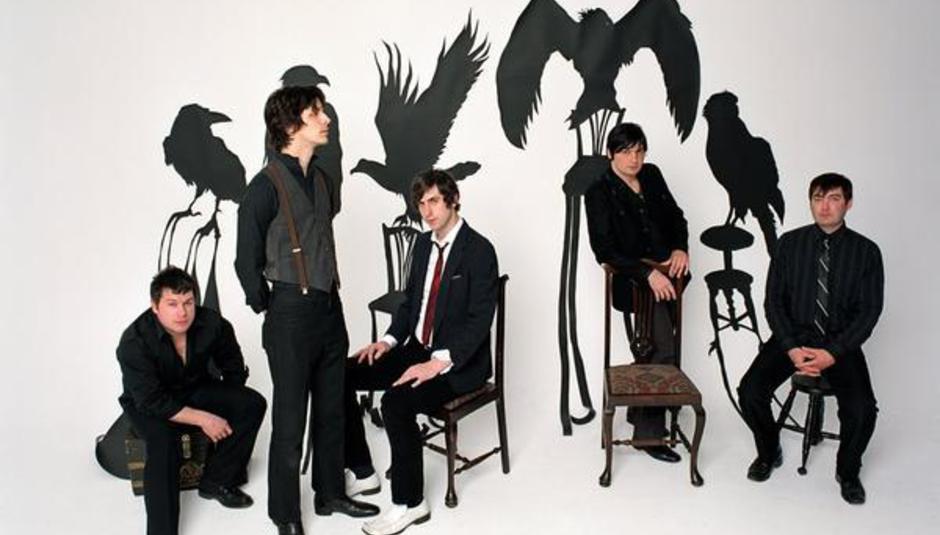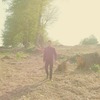…And You Will Know Us By The Trail Of Dead are a rarity in an increasingly disposable age of music: childhood friends Conrad Keely and Jason Reece have been making a career out of the band for the past seventeen years. They survived being dropped by a major label and bounced back with their own imprint, and they made a DiS recommended with Tao Of The Dead, an album that included a mind-bendingly epic 16 minute long track.
Another thing that distinguishes the band is their slavish devotion to artwork, which over the course of seven albums has all painstakingly sketched by Conrad. Tao Of The Dead took things one step further, along with drawing the album artwork the record was accompanied by a graphic novel and 30 page short story both drawn and written by Conrad.
When the band were last in the UK, we took the opportunity to chat to Conrad about why artwork is so important to the band and the place of artwork in music today, as well as finding out more about the recording and inspiration behind Tao Of The Dead.
You’ve just finished a joint headline tour with Rival Schools. How was it?
We shared a bus. It was the first time we’ve shared a bus with a band and we got along famously - it was great. It was kind of like camping out together for three weeks.
Did you know the band before?
Only a little bit. We’d met each other and we were aware of each other, but we’d never hung out like that before. What happened? I was at the farmer’s market in Union Square in New York looking for maple syrup and ran past Sam, and he stopped me and was like: ‘What have you been up to?” and I was like, “We been working on a record and it’s coming out in March and we’re going to go to Europe” and I said, “we should play some shows together”. I didn’t think anything of it, I mentioned it to our manager and next thing I know the tour is booked and we’re touring together.
You’re playing a small show at the Windmill tonight, which includes a showing of your art. Why did you decide to do the show there?
Well, it was an opportunity to display some of the artwork and we thought it would be a cool thing to do a last minute show.
You’ve described your artwork as a ‘digi-novella’. Why did you decide to create such extensive artwork for the album?
Well, mainly I had a story to tell and I just needed a way to get it out and merge it with the music. I’d been developing this world since I was a kid and I decided that now was the time to debut it and bring it into the light. What I did with the art on this album is just a fraction of the story; it’s kind of an introduction.
What’s that story about?
Well, there’s a lot of stories; each of the characters themselves have their own story. The planet itself that it takes place on and the universe that it’s set in are stories; you know the landscape adds character too. So, it’s nothing that I can really explain or lay down in simple terms.
Are there any artists or comic book artists that you take inspiration from?
I actually get inspiration mainly from writers, like: Jane Austen, Leo Tolstoy, Alexander Dumas, Victor Hugo - kind of classic novelist .All of the ones that I mentioned, except from Jane Austen, all work in the medium of the serial novel and I kind of wanted to do the same with this where I release a little bit at a time.
Album artwork seems to be dying out as an art form as people buy music digitally, opposed to physically going out and buying the CD or vinyl and getting the whole complete package. Do you feel it’s still important to have artwork with the album?
Absolutely. For me, that’s what the album is - it’s an excuse to make album art. And, I don’t know if I’d necessarily agree with you that it’s dying out; I think in a way we’re living in this new renaissance of album art. There’s some really great album art that’s being created right now from bands like Mastodon, Baroness, and I really like that one cover that Joanna Newsom had. So, there’s some really beautiful album art. Vinyl hasn’t really died away; you can say something like the cassette tape has definitely seemed like it’s passé, but the vinyl is experiencing a resurgence.
A lot of new bands are releasing their songs on cassette. I think because artwork is being reduced to a selection of gifs people are starting to really appreciate having the physical product again.
I think people really appreciate that. Also, this is a great time for literature and books are experiencing this phenomenon where you’ve got rock star celebrity authors. As long as there are artists and people who are creative in that sense and they’re wanting to create work, the industry in that sense has to cater to the needs of the creative.
You mentioned before that the artwork is a continuation of a theme and Tao Of The Dead seems to also have been conceived as a complete narrative. Did you conceive both of them in the same way?
It’s more like a journey. Like, Tao Of The Dead doesn’t really have a strict narrative but there are two parts and they both kind of represent two different journeys. The art that accompanies them has a narrative, but they’re not necessarily strictly associative. I want more of the association to be left to the imagination of the listener; I would never dictate how they’re supposed to appreciate the art and the music together.
The album seem to have been created in a very prescriptive way as the tracks all flow into each other as one seamless piece. Was that the case?
Yeah, and we recorded it in the same sequence that it’s on the record.
The recording time was quite short. 10 days?
Yeah, for the basic tracks. We wanted to work fast; we knew what wanted to do and we decided to go for it. We didn’t want to muck about and like over-obsess like we did in the past. It felt really good, liberating.
You recorded with Chris Coady and your long-term producer Frenchie. What made you choose to work with Chris?
We started with Chris Coady only because Frenchie wasn’t available right away, but the intention was always to do it with Frenchie. But, we had a lot of stuff we needed to do to start so we wanted to get a head start, so that’s when we started working on the record with Frenchie and we’d have some of it taken care of. So, Chris Coady did some of the basic tracks for Part II but he did it in such a way that he didn’t leave any fingerprints on it; he was just going to do the basic track and leave it open. He was like, doing us a favour by starting the record.
You recorded with a stripped down line-up of only four members compared to the larger line-ups on previous albums.
It was stripped down in some ways, but it was actually more collaborative than the last few records. With the other records, because there were so many cooks in the kitchen we couldn’t all be working on something at once. With this one as there were only four of us we could all work on it at the same time and compose at the same – it was far more collaborative.
You recorded in upstate New York and in Texas near the Mexican border. Did your surroundings have any direct influence on the record?
Absolutely. Where we did the El Paso recordings it was right next to Juarez and there was this war going on and people were being murdered. We were finding about these horrible things that were happening every day and that definitely informed the lyrics, especially for the song ‘Summer Of All Dead Souls’ because that’s basically what that songs about.
Tao Of The Dead is dominated by themes of war and society. Was that something you wanted to focus on?
I think that’s essentially true of all of our albums and all of our songs.
Apart from ‘Mistakes And Regrets’ you’ve never really been a band that does break-up songs...
I have a couple. I have break-up songs, but they’re not always overt. ‘Another Morning Stoner’, that’s a break-up song and you wouldn’t know it It was breaking up with someone over theology, so that was kind of a weird thing!
It’s hard for us, at least right now as human beings, to really ignore what’s going on and we have to address it some way, especially living in America we feel that there’s a lot of attention being paid to the moves America is making in the world these days. It’s inescapable and it makes us feel somewhat self conscious.
That’s the legacy of America as a whole, isn’t it?
It’s a young legacy, it’s not an old legacy, it’s not an ancient legacy like Britain; we’re still new on the scene as far as that goes. But, it’s something to feel a bit self-conscious about and kind of address and give people the impression that we’re not ignoring it. That’s what I find myself feeling disappointed in music nowadays, that it’s not current with anything that’s going on.
It’s not politicised anymore, it’s about escapism.
Exactly. I feel like our music is escapism on a musical level, but our lyrics are really grounded in reality.
For a band that has 16 minute tracks, you’re music is still really accessible. I took a friend to one of your shows and she knew nothing about you and is now completely into you.
Thanks. I was very flattered by someone who told me pretty much what you just said, who worked at the club and didn’t know much about us and that happened to be the drummer in a band that I’m really into, The Wolf People. I got to hang out with him and talked to him about the recording process of that album, which I think is one of my favourite records that’s come out in a long time. They have an aesthetic where they know how to conjure up a certain period in rock history, but futurise [sic] it to make it pop contemporary.
You’re touring with a new line-up. Who’s in the band at the moment?
Autry Fulbright our bass player worked on the album. The drummer who played on the record and played on our last few records went to cooking school, so Jamie Miller is new but he plays guitar as well so it’s been a great time.
From seeing you at the Electric Ballroom you already fit well together as a band, and live whatever your line-up you have you’re always a tight live band even though you and Jason are the only constant members.
I think with Jason and I it’s a lot easier as we went to high school together and have know each other for a long time, so a lot of our relationship is almost telepathic y’know? A lot doesn’t have to be communicated.
I’m really happy with the current line-up and I’m really excited to do a record with Jamie and Autry and make it collaborative. Whoever we’ve been working with they’ve always had something to do with the album and the writing, but as far as remaining in the band it’s really been a personal choice for the most part; not everyone wants to be in a band. I know some people dream about it all their lives, but the harsh reality of it is it’s not glamorous, so a lot of people have decided to pursue their own dreams and I’ve always encouraged that. It’s never been overly contentious.
You and Jason have been in the band for 17 years. How have you lasted so long?
What keeps it going beside our sense of humour is our mutual respect for each other’s taste and kind of trust in each other’s aesthetic sensibilities; we know that one of us will tell the other if an idea’s not good and the other will trust that.
You left Interscope before Century Of Self and set-up your own label. What was the change like from being on a major to going it alone?
As far as our label, it’s more of like a brand. The label we’re working with at the moment, Superbowl, it’s a really small label of like three or four people, so it makes it easier to get things done. That was our problem really at Interscope was that it was too cumbersome.
Did you have any pressure whilst you were on Interscope?
Never. It was almost as if they weren’t pushing us enough; we drifted away from them. I wanted to be exploited! Please exploit my talent!
It did seem like around Source Tags And Codes that you were on the brink of something big and that didn’t materialise as you weren’t in the public eye as much as you probably should have been.
Yeah, and it coincided with a lot of changes in the music industry, which I think were inevitable but definitely outside of our control. With the money that was being lost in the major industry they had to concentrate on pop acts.
When do you think you’re going to start on another record?
Soon. I’m feeling the momentum is going, so we’ll probably start it in the fall.
Are you going to continue with the same theme?
There’ll be a continuation of the story and with the music - we’ll see how it goes. I never put any expectations towards that - I just let the ideas come naturally.
Tao Of The Dead is out now.






















